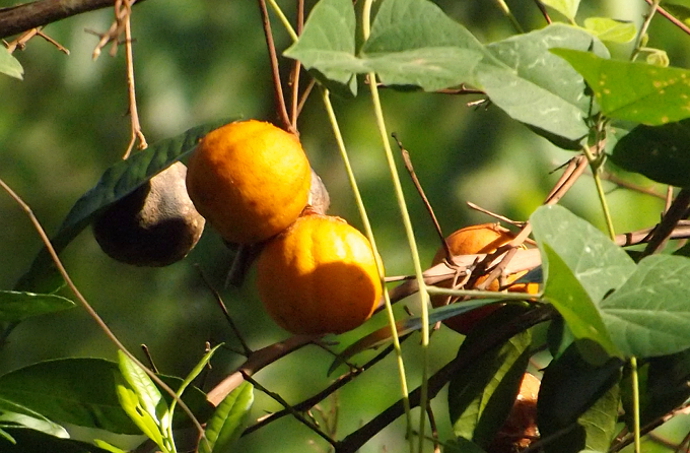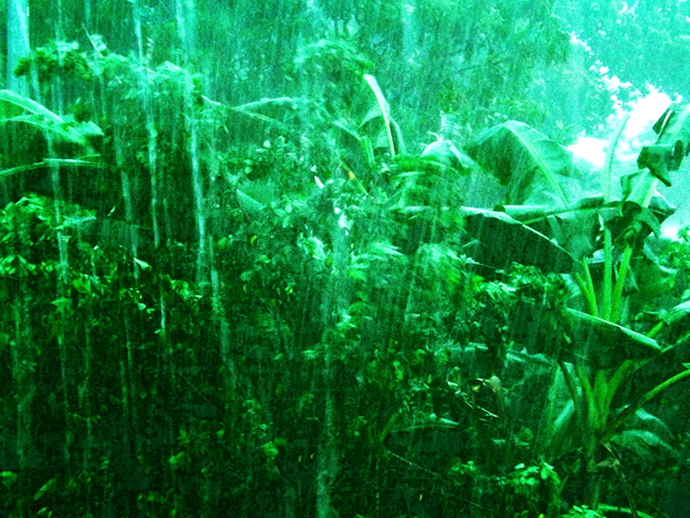Water and blights: Panama’s agricultural woes are not just the trade, marketing and finance issues that grab the most attention. Shifting ranges of plant and animal pathogens and insect pests also play a role. New strains of diseases to which some of our traditional crops had been immune now can devastate farm production. Climate change has brought us erratic rainfall years within an overall 30-year drying trend. Archive photo by Eric Jackson with some bananas that had to be removed due to a fungal blight.
Cortizo’s first moves on food and farm issues
by Eric Jackson
It has become a Panamanian political tradition for new presidents to take their first cabinet meetings on the road in order to set the main themes of what they hope to do. President Laurentino “Nito” Cortizo did this on July 2, convening a cabinet session at the National Institute of Agriculture (INA) in Divisa.
The new president is a former agriculture minister who left a PRD administration over “free trade” in farm products, a cattle breeder and former legislator from Colon province’s rural coastal circuit. He pretty much knows Panamanian agriculture, to the extent than anyone can these days.
Before he was sworn in, Cortizo met with many a foreign diplomat, head or state or cabinet minister. Read the reports of these at in the two most salient, meetings with US and Chinese representatives, on the lists of foreign policy goals were increased Panamanian beef exports to the United States and to China. (The Americans may have had an actor who played cowboys as a president in living memory, but Panama has a real cowboy of sorts.) Aside from beef exports, a number of his discussions with those from foreign governments broached the subject of bringing in technical and educational help for the farm sector.
The first cabinet meeting being at the INA, Cortizo played to the home campus crowd. He intends to upgrade the title and function to make it the Agrotechnological Institute of the Americas before the year is out. The change will likely be more than symbolic.
Were the financial moves that those Panamanian media dominated by financial and real estate sectors emphasized the most important things at the meeting? Yes, he will jiggle things around with the proceeds of the Special Interest Compensation Fund (FECI) to move more of the proceeds from that subsidized load program from the construction sector to agriculture. It will probably not be enough to fund dramatic changes in the farm sector.
AUPSA, the Panamanian Food Security Authority, an alphabet agency created in tandem with free trade with the United States, is to be abolished. It’s one of those governmental entities that, common enough in the world, was captured by the interests it was supposed to regulate.
They were supposed to regulate food imports so as not to let them drive the nation’s farmers out of business? Instead they used that power to open the gates, in the name of cheaper food but mainly in the interest of food importers. Panamanian rice production fell in particularly dramatic fashion.
They were supposed to maintain food safety standards? Instead they took whatever special interest finding that was imposed on the US government, such that foods with chemicals and hormones that are not allowed to enter Canadian or European markets came here.
So AUPSA will be no more. The imported food safety inspections and certifications will be devolved to the Ministry of Agricultural Development..
Cortizo also intends to rearrange, but not eliminate, retail food price controls. Currently there are 22 products — eggs, chicken, certain cuts of pork, macaroni noodles and so on — subject to price controls. Look for some items to be taken off of the list and others to be added.
This is a continuation of traditional policy. It runs against the objections of neoliberal ideologues who are against any state interference with markets. Varela used such measures, with a wide range of price controls and subsidies were aimed mainly at maintaining social peace. With Martinelli the supermarket baron and food importer, these measures were downgraded and twisted to benefit the economic interests of Ricardo Martinelli.
Talk of market distortions and running up the national debt are parts of discourse about consumer price controls and subsidies, including within the Cortizo political camp. But the PRD has always been for a few price controls to reduce hunger and sufficient subsidies to keep the nation’s grandmothers from having their electricity shut off en masse. Look for a presidential decree with a new list of price controlled foods within a few days. (We got a new six-month electric rate decree as one of the last Varela measures, and this raises rates a bit for upper-end consumers — mostly businesses — while it maintains subsidies for people on the lower end.)
Perhaps most ignored, but arguably most important, of the agricultural moves at Cortizo’s first cabinet meeting? It wasn’t purely for the farm sector but he said that he’s creating a National Water Council. Huge issue, maybe in the face of climate change the biggest of them all. With the dysfunctional political patronage outfit that’s the IDAAN water and sewer authority, the Panama Canal Authority, the Ministry of Health, the Ministry of the Environment, the Ministry of Agriculture and the many local rural aqueduct systems among the institutional stakeholders to assert various dibs on water, it’s a political minefield.

Ah, soda limes. Maybe not the most popular citrus fruit we grow, but they thrive here. Why doesn’t Panama export more citrus products? It’s largely because we have Mediterranean fruit flies here. The technology to deal with that — releasing sterilized male flies into the environment — is well enough known. But if we did that or used any other method to rid ourselves of the medflies, surely citrus growers in places like Florida, Calilfornia and South China would find other reasons to object to imports from Panama. Archive photo by Eric Jackson.
These links are interactive — click on the boxes













